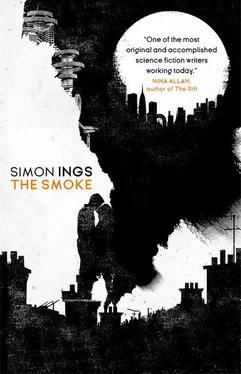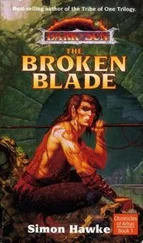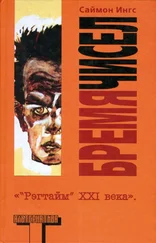‘Dad,’ I said quickly, before she could say anything, ‘stop messing about. Come and help me clear up.’
Georgy shot me a look that might have been admiring. I ignored him; I just needed to get Bob out of the room. Let the Chernoys fight among themselves if they wanted to.
In the kitchen, Bob emptied his plate into the bin and handed it to me. He’d eaten hardly anything.
‘Too spicy?’
He shrugged.
‘Come and help me wash up.’
I washed, Bob dried. What did you do all day? I wondered. Traipsed around the city. Supped tea in cafeterias. Rolled up at the pub at last. What? You told Jim but you won’t tell me. ‘You should have gone to see Mum,’ I said.
Bob glanced at me, and quickly away. ‘I did.’
‘Right.’
‘You calling me a liar, lad?’
‘Yep.’
Stella came bustling in. ‘What are you two still doing in here? Come out! Leave that. There’s dessert.’ The party was coming to pieces in her hands. I felt sorry for her, but really, what else could she have possibly expected? Had she imagined that all the bits of unresolved family business she had hurled together willy-nilly this evening would unlock each other, as neatly as a stage comedy? But of course she had. This, after all, was the world she lived in: the scripted world of the stage, where complications only got tangled up in Act Two in order to unwind in Act Three.
Only there wasn’t going to be any Act Three. Not tonight: not with Georgy drunk and raiding the fridge for another beer, and Stella, suddenly losing her cool, pulling hard on his arm to stop him. The fridge door flew open and a carton of milk toppled out of the door and landed at my feet. I snatched it up but it had burst and it leaked all over my hands and down the front of my trousers as I juggled it into the kitchen.
By the time I came back, Georgy was shifting, none too elegantly, into a penitent gear. It was already arranged that Bob would stay over, so Georgy was going to have to mend fences somehow. He said to Bob: ‘I honest-to-goodness didn’t mean anything bad by it.’
Bob was the taller of the two men, but his baffled, hypnotised expression revealed that Georgy, even as an unaccustomed drunk, knew how to handle men like Bob: simple working men for whom even their own sense of self-worth acted as a brake on their self-assertion.
Fel ordered an autonomous cab for us. We rode most of the way home in silence, until at last she said: ‘Your mother dies tomorrow.’
I looked out through the window. It was a dry, clear night. Christmas Eve. I was surprised the streets were so empty. ‘Yes.’
‘No one said anything about it.’
‘No. Well, Jim and Bob went to see Mum earlier today. In the end, there is nothing to say, is there?’
‘Isn’t there?’
‘For crying out loud, what do you want me to say?’
‘I’m sorry.’
‘That I’m losing her again? You need me to spell this out?’
‘It’s all right.’
‘That I’ve never particularly liked her?’
‘That’s not true.’
‘Love and like are different things. Deal with it. God knows I’ve had to.’
She put her arm around me. I tried to calm down. I did. Only I didn’t want to be put on the spot. I couldn’t bear the way Bob had sloped off again, and I couldn’t convince myself that I was any better. And the way the evening had ended: that still rankled. ‘Your father’s an arsehole,’ I said.
‘Yes.’ She offered nothing else. She didn’t laugh. She didn’t turn it into a joke. She didn’t want to be angry with me. She waited for me to calm down.
I took her hand. ‘I’m sorry.’
She squeezed my fingers. ‘What will you do tomorrow?’
‘Do?’
‘Are you going to Croydon to see Jim off?’
‘Of course.’
She took my hand and massaged it, as though trying to read something there. ‘And your mum?’
‘I’ve been to see her,’ I said. ‘There’s nothing left.’
‘There’s the birth.’
‘I’m not interested in that.’
We were approaching Moorgate when she said, ‘I’ll go there tomorrow. I’ll go to Ladywell. Someone should be there.’
I shrugged. ‘If that’s what you want to do. I guess you understand it better than I do.’
We got to the flat and undressed and huddled together under the duvet. I’d had enough. I couldn’t bear the thought of talking any more. But as usually happens whenever I try to force sleep upon myself, it didn’t last. In the middle of the night I woke up, brain ticking and buzzing as though it were already morning, only I was convinced there was a stranger in the room.
I stretched out for Fel but found only bedlinen. I sat up abruptly, sure that by doing so I would shake off what could only be a dream. A glitch of the sleeping mind.
But the presence persisted. It was real enough, though invisible, and felt tied to Fel’s absence. I stared numbly at the empty half of our bed. Fel was not in the bedroom. I blinked, orientating myself.
The door was ajar. Light fanned in from the living room. I got up. The laminate flooring was cold and sticky against my feet. The French window was open, letting in distant traffic sounds, the city never quite sleeping. Fel was on the balcony. She glanced at me and smiled and the diamond set in her tooth and all the stones in her ear glittered in the moonlight.
She turned back and looked up at the sky. I followed her gaze. A half-moon was rising above the blocks of the estate. Where the Moon’s dark half should have blocked out the stars, there were lights. Just a few, very faint. Four or five of them. Six. Maybe seven. My eyes, adjusting, caught the hint of more, though I had to look to one side of the Moon to detect them. They were faint enough that they disappeared when looked at directly.
They hung in no particular pattern, and shone with the same modest brightness as the surrounding stars so that it appeared, after a few seconds, as though they were indeed stars, and the dark half of the Moon was entirely missing. A few seconds later, the illusion righted itself, and reason took hold again, and I was looking at the unlit half of the Moon. And there were lights. Lights on the Moon.
The Moon was inhabited. I’d read the papers. I knew the inhabitants were only machines. Diggers, cranes and drills. But still. Fires were burning. I had not seen this before. Not with the naked eye. I must have said something. It was quite a sight.
Here, however, memory breaks down. It fails me, and I can’t be sure which of us next spoke.
‘Fires are burning.’
Nonsense.
I took Fel by the hand. ‘Come to bed.’
Champions of the Process called Georgy Chernoy’s medicalised infants the ‘reborn’. Critics dubbed them the ‘undead’. To me they were just strange children. Their bodies, though growing at an accelerated rate, never quite managed to catch up with their impatient, adultish minds. I was never able to take them entirely seriously, not even when one of them was my own mother. Fel persuaded me to visit my new mum around the time she was three months old, and had started to use sign language. Fel was infatuated. Whenever the weather allowed she had been wheeling Betty around the memory parks of Medicine City, and the therapy was having the desired effect. ‘Betty knows who she is now,’ Fel assured me. ‘She’s been asking after you.’ As though this would encourage me. But Fel’s enthusiasm was winning, and my own curiosity was growing. What finally tipped the scales was Betty leaving the nursery. Stella took her back to her house in Islington to look after her, now that she no longer needed specialist care.
‘It’s just a matter of patience,’ Fel explained to me. ‘Your mum’s memories are all there. It’s just a question of encouraging her to work through her old life. She needs to call everything to mind. You should go and see her. You should talk to her. You should make the connection.’
Читать дальше












